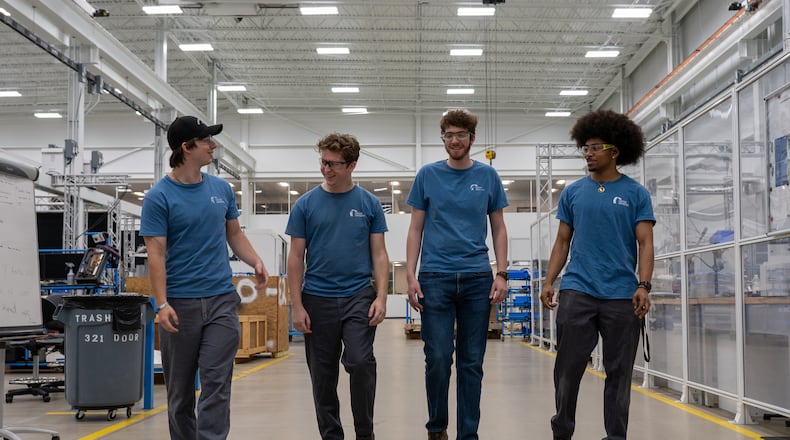They were selected from more than 60 applicants, and United Grinding leaders expect next year’s class of applicants to only grow.
Why? Apprentices are paid $19.50 to learn to cut metal to minute tolerances, read schematics, assemble and repair grinding machines. They receive company benefits, including 30 days paid time off each year and a 401(k) account. The company covers their Sinclair tuition and expenses, including books.
They also sign four-year contracts to work for United Grinding.
Markus Stolmar, president and chief executive of the precision metal-working company since 2019, acknowledges that his company’s approach entails an upfront investment.
But high turnover and sloppy work exact their own costs, Stolmar and his team say. While Amy Luther, who oversees human resources work at the company, put worker turnover at the average manufacturer at more than 40%, she said United Grinding’s turnover is closer to 8.5%. She attributes that in part to competitive pay.
“If you talk with people who have been a long time in this industry, there were programs, back in the day,” said Stolmar, who took his first steps in manufacturing as an apprentice in Germany. “Nowadays, you talk to people, and it seems like they don’t have time anymore to train employees. They can’t invest in them. It costs too much money.”
But if you don’t invest in employees, you won’t reap the dividends, he contends. In an industry that expects workers to honor tolerances of millionths of an inch, training is crucial.
“40 millionths of an inch is a micron,” he said. “And that’s where we are. In order to do that, you have to have a certain work ethic, a certain cleanliness, a certain understanding.”
Owen Johantges, a 21-year-old United Grinding apprentice starting the second year of his apprenticeship, sounds like he has no complaints.
“A cool thing is the apprentices who have been here a while try to teach the next generation, to share their skills, their electric knowledge‚” Johantges, a Mason resident, said while taking a break from deciphering a schematic. “I’m definitely being challenged, but not overly stressed. They really push you up to the limit.”
During the company interview, he saw how this could become a career for him.
“They really outlined what you can do after this, not just with this company, but also how you can take your skills elsewhere,” he said.
United Grinding has about 60 employees in its 110,000-square-foot plant off Austin Boulevard. This company sells, services and distributes CNC (computer numeric control) grinding machines across North America, many of which are made in Europe. Customers range from GE Aerospace to tiny machine shops with only a few workers.
Since World War II, the Dayton area established itself near the center of what might be seen as industrial grinding, home to companies like Sheffield Corp., Stolmar noted. More than half of his customers are within a day’s drive of Dayton.
“That makes a huge difference for us,” the CEO said.
Andreas Brockmann, who oversees the company’s apprentices, said he needs young people who can think on their feet and work with their hands. And while he is happy to work closely with apprentices, he also needs quick learners who can work independently when the time is right.
“I’m not helicoptering around them all the time,” Brockmann said.
It’s not just aptitude. It’s attitude.
“We were looking for people who have that technical apptitude and people who have ambition for their own future,” Luther said. “Some kids with ambition and goals.”
More can be learned about the company’s apprenticeship program at www.grinding.com/en/about-us/our-team/apprenticeship-program/
About the Author


